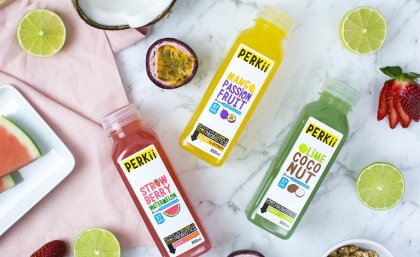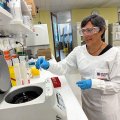
UniQuest, the commercialisation company of The University of Queensland, is today celebrating the creation of more than 100 startups.
UQ Vice-Chancellor and President Professor Peter Høj said more than 100 companies had been created based on intellectual property from UQ research since 1988, with probiotic drink startup Perkii the 100th to be formed.
“The creation of more than 100 startup companies is an impressive milestone on a global scale and one that is unsurpassed by any other Australian university,” he said.
“Our startups have gone on to raise more than $625 million to commercialise world-leading UQ research and products stemming from our technologies have amassed sales in excess of $US 16 billion.
“From publicly-available data, UQ is streets ahead of any other Australian university in terms of the number of startups created, and UniQuest is among the highest performing technology transfer offices in the world.
“This sends a strong signal to businesses around the world that Queensland, and UQ, is a great place to access and invest in quality research that delivers real impact.”
Perkii was formed by UniQuest in 2016 and uses technology developed by another UQ startup called ProGel. ProGel was founded in 2001 around the research of Professor Bhesh Bhandari from UQ’s Faculty of Science.
Perkii uses the technology to deliver beneficial bacteria, such as probiotics, safely to the gut.
Perkii CEO Matthew Kowal said the drink was made in Queensland with the help of the Food Innovation Centre and was now available in more than 2000 stores across Australia and New Zealand.
“We’re targeting people who are busy and looking for a healthier, functional alternative to soft drinks or juice, and we’re using the power of science to deliver on both function and flavour,” he said.
“The market for probiotic drinks is growing rapidly and we are aiming for $3 million in turnover this financial year, as we explore new international opportunities opening up in the United States and Asia.”
UniQuest CEO Dr Dean Moss said Perkii was just one of countless successful companies formed over the past 30 years.
“UniQuest’s industry-trained staff apply a rigorous technical and commercial diligence process in commercialising UQ’s intellectual property,” he said.
Dr Moss said UniQuest’s commercial discipline meant its success rate contradicted the often-cited rule-of-thumb that up to 90 per cent of startups failed.
“I’m proud that the UniQuest startup success rate is comparatively very high, with 46 per cent still operational or having exited the market through a commercial transaction such as a trade sale,” he said.
He said one such successful exit was Spinifex Pharmaceuticals – a company developing a potential first-in-class oral treatment for inflammatory and neuropathic pain – which was acquired in a $1 billion deal by Novartis in 2015.
“In addition to creating startups, UniQuest has been successful in licensing intellectual property to national and international companies with the infrastructure and resources to ensure that the intellectual property reaches the market,” Dr Moss said.
“Examples include licensing the technology that led to the life-saving Gardasil cervical cancer vaccine; the magnetic resonance imaging technology to Siemens and GE Healthcare; the world-renowned Triple P parenting program; and commercialisation agreements with international biotech companies including Merck and Zealand Pharma A/S.”
Media: UniQuest, Brooke Baskin, b.baskin@uniquest.com.au, 0409 767 199.
UniQuest’s 100 startups include:
- Spinifex – developing a potential first-in-class oral treatment for inflammatory and neuropathic pain. Acquired in a billion-dollar deal by Novartis in 2015.
- Dendright - developing a new treatment targeting the cause (rather than just the symptoms) of rheumatoid arthritis. Currently in the clinic.
- QUE Oncology – UQ/Emory University collaboration to develop novel therapies to address unmet medical needs in the treatment of cancer and its consequences. Last year secured US$16m Series A investment to develop an oral, non-hormone drug candidate to treat hot flashes in women receiving anti-estrogen therapy for breast cancer.
- Inflazome – developing new medicines to treat inflammatory disorders and raised $22M in a series A investment
- Protagonist – developing orally stable peptide drugs, giving patients a potential alternative to injectable-only biologic drugs. In 2017 granted Janssen exclusive worldwide rights to a first-in-class oral peptide receptor antagonist in pre-clinical development for treatment of Irritable Bowel Syndrome.
- Vaxxas – commercialising the NanopatchTM technology for vaccine delivery that could replace the traditional needle and syringe. Raised nearly $50m investment to date o advance through to clinical trials.
- ProGel – technology to microencapsulate bacteria, therapeutic biologics and drugs to help retain its integrity through the acidic stomach environment
- NexGen Plants – a novel non-GM technology to introduce pathogen-resistance, production or consumer traits in crops.
.jpg)









